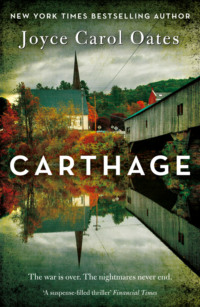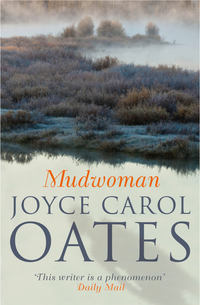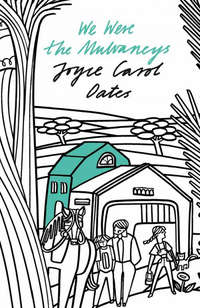
Полная версия
My Life as a Rat
Headlights turning into the driveway, in the dark. Your father’s car braking in front of the garage.
By chance you were walking in the upstairs hall. Cast your eyes down, through the filmy curtains seeing the car turn in from the street. Already it was late. He’d missed supper. Past 9:00 P.M. No one asked any longer—Where’s Daddy?
In the hall beside the window you paused. Your heart was not yet beating unpleasantly hard. You were (merely) waiting for the car lights to be switched off below. Waiting for the motor to be switched off. Waiting for the familiar sound of a car door slammed shut which would mean that your father had gotten out of the car and was approaching the house to enter by the rear door to signal Nothing has changed. We are as we were.
But this did not seem to be happening. Your father remained in the (darkened) car.
Still the motor was running. Pale smoke lifted from the tailpipe. You were beginning to smell the exhaust, and to feel faintly nauseated.
In the hall by the window you stood. Staring down at the driveway, the idling car. Waiting.
He is not running carbon monoxide into the car. The car is not inside the garage, there is no danger that he will poison himself.
Yet, gray smoke continued to lift from the rear of the car. Stink of exhaust borne on the cold wet air like ash.
He is sitting in the car. He is smoking in the car.
Waiting to get sober. Inside the car.
That is where he is: in the car.
He is safe. No one can harm him. You can see—he is in the car.
You could not actually see your father from where you stood. But there was no doubt in your mind, he was in the car.
Had Daddy been drinking, was that why he was late returning home, you would not inquire. Each time Daddy entered the house in the evening unsteady on his feet, frowning, his handsome face coarse and flushed, you would want to think it was the first time and it was a surprise and unexpected. You would not want to think—Please no. Not again.
You would want to retreat quickly before his gaze was flung out, like a grappling hook, to hook his favorite daughter Vi’let Rue.
It was one of those days in the aftermath of the death of Hadrian Johnson when nothing seemed to have happened. And yet—always there was the expectation that something will happen.
Your brothers had not been summoned, with O’Hagan, to police headquarters that day. So far as anyone knew, the others—Walt, Don—had not been summoned either.
No arrests had (yet) been made but your brothers were captive animals. Everyone in the Kerrigan house was a captive animal.
They’d ceased reading the South Niagara Union Journal. Someone, might’ve been Daddy, tossed the paper quickly away into the recycling bin as soon as it arrived in the early morning,
For articles about the savage beating, murder of Hadrian Johnson continued to appear on the front page. The photograph of Hadrian Johnson continued to appear. Gat-toothed black boy smiling and gazing upward as if searching for a friendly face.
You saw the newspaper, in secret. Not each day but some days.
These people are killing us. Possibly, your mother meant the newspaper people. The TV people.
You are beginning to feel uneasy, at the window. You are beginning to wonder if indeed your father is actually in the car. And it is wrong of you to spy upon your father as it is wrong to spy upon your mother. Faces sagging like wetted tissue when they believe that no one is watching. Oh, you love them!
In the car Daddy is (probably) smoking. Maybe he brought a can of ale with him from the tavern. Maybe a bottle.
The bottles are more serious than the cans. The bottles—whiskey, bourbon—are more recent than the cans.
In the plastic recycling bin, glass bottles chiming against one another.
Daddy is not supposed to smoke. Daddy has been warned.
A spot on his lung two years before but a benign spot. High blood pressure.
More than once Daddy has declared that he has quit smoking—for the final time.
When Daddy smokes he coughs badly. In the early morning you are wakened hearing him. So painful, lacerating as if someone is scraping a knife against the inside of his throat.
Years ago when you were a little girl Daddy would come bounding into the house—Hey! I’m home.
Calling for you—Hey Vi’let Rue! Daddy is home.
Where’s Daddy’s best girl? Vi’let RUE!
That happy time. You might have thought it would last forever. Like a TV cartoon now, exaggerated and unbelievable.
Now Daddy is showing no inclination to come into the house. (Maybe he has fallen asleep, behind the wheel? A bottle in his hand, that is beginning to tip over and spill its contents …) He has turned off the motor, at least. You are relieved, the poison-pale smoke has ceased to lift from the tailpipe.
He’s coming inside now. Soon.
There is a meal for Daddy, in the oven. Covered in aluminum foil.
Even when your mother must know that Daddy won’t be eating the supper she has prepared for him there is a meal in the oven which, next day, midday when no one is around, Mom will devour alone in the kitchen rarely troubling to heat it in the microwave. (You have seen her with a fork picking, picking, picking at the cold coagulated meat, mashed potatoes. You have seen your mother eating without appetite, swiftly picking at tasteless food.)
It is unnerving to you, the possibility that no one is in the car.
In the driveway, in the dark. Dim reflected light from a streetlight in the wet pavement.
No, there’s no one there!
Somehow, your father has slipped past you. You have failed to see him.
Or, your father has slumped over behind the wheel, unconscious. He has found an ingenious way to divert the carbon monoxide into the car while no one noticed …
The father of a classmate at school has died, a few weeks ago. Shocking, but mysterious. What do you say?
You say nothing. Nothing to say. Avoid the girl, not a friend of yours anyway.
As, at school, your friends have begun to avoid you.
Pretending not to notice. Not to care. Hiding in a toilet stall dabbing wetted tissues against your face. Why are your eyelids so red? So swollen?
But now you have begun to be frightened. You wonder if you should seek out your mother. Mom? Daddy is still in the car, he has been out there a long time … But the thought of uttering such words, allowing your parents to know that you are spying on them, is not possible.
And then, this happens: you see someone leave the house almost directly below, and cross to the car in the driveway.
Is it—your mother?
She, too, must have been standing at a window, downstairs. She’d seen the headlights turning into the driveway. She’d been waiting, too.
Slipping her arms into the sleeves of someone’s jacket, too large for her. Bare-headed in light-falling snow that melts as soon as it touches the pavement, and her hair.
It is brave of Mom to be approaching Daddy, you think. You hold your breath wondering what will happen.
For you, your sisters, and your brothers have seen, numerous times, your father throwing off your mother’s hand, if she touches him in a way that is insulting or annoying to him. You have seen your father stare at your mother with such hatred, your instinct is to run away in terror.
In terror that that face of wrath will be turned onto you.
You are watching anxiously as, at the car, on the farther side of the car where you can’t see her clearly, your mother stoops to open the door. Tugging at the door, unassisted by anyone inside.
And now, what is your mother doing? Helping your father out of the car?
You have never seen your mother helping your father in any way, like this. You are certain.
At first, it isn’t clear that Daddy is getting out of the car. That Daddy is able to get out of the car.
It has become late, on Black Rock Street. A working-class neighborhood in which houses begin to darken by 10:00 P.M.
In early winter, houses begin to lighten before dawn.
Up and down the street, in winter, when the sun is slow to appear, windows of kitchens are warmly lit in the hour before dawn. You will remember this, in your exile.
Well—Daddy is on his feet, in the driveway. He has climbed out of the car with Mom’s assistance, and he does not appear to be angry at her. His shoulders are slumped, his legs move leadenly. The lightness in his body you remember from a time when you were a little girl, the rough joy with which he’d danced about in the garage, teaching your brothers to box, has passed from him. His youth has passed from him. The years of his young fatherhood when his sons and daughters had been beautiful to him, when he’d stared at them with love and felt a fatherly pride in them, have passed.
Transfixed at the window you watch. For the danger is not past yet.
You steel yourself: your father will fling your mother from him with a sweep of his arm, he will curse her …
But no, astonishingly that doesn’t seem to be happening. Instead, your father has allowed your mother to slip her arm around his waist. He steadies himself against her, leaning heavily on her.
Awkwardly, cautiously they make their way toward the house. Taking care not to slip on the driveway where ice is beginning to form, thin as a membrane.
What words have they exchanged? What has your mother said to your father, that has blunted his rage?
You have drawn away from the window. You have let the curtain fall back into place. You do not want either of your parents to glance up, to see you at the window, watching.
It is a remarkable fact, your father leaning heavily upon your mother, who is several inches shorter than he, and must weigh seventy pounds less than he does. Yet she holds him up without staggering, your mother is stronger than you would have imagined.
Together your parents approach the house, walking cautiously, like much older people, in this way you’ve never seen. They pass out of your sight, below. You stand very still waiting for them to enter the house, waiting to hear the door open below, and close, so you can think, calmly—They are both safe now. For now.
The Secret I
THERE IS A SECRET BETWEEN MY MOTHER AND ME. ALL THESE years in exile, I have told no one.
In fact, there are secrets. Which one shall I reveal first?
In sixth grade I’d become friendly with a girl named Geraldine Pyne. Several times she invited me to her house after school, on Highgate Avenue. Her father was a doctor in a specialty that made me shiver—gastroenterology. She lived in a large white brick house with a portico and columns like a temple. When I first saw Geraldine’s house I felt a twinge of dread for I understood that my mother would not like me to visit there and would be unhappy if she knew.
I understood too that my father would disapprove, for my father spoke resentfully of “money people.” But my father would not ever know about Geraldine Pyne, and it was possible that my mother would.
On days when Geraldine invited me to her house for dinner Mrs. Pyne usually picked us up after school, and either Mrs. Pyne or her housekeeper drove me home afterward; there was no suggestion that my mother might come to pick me up.
Mrs. Pyne’s station wagon was not a very special vehicle, like the long, shiny black Lincoln Dr. Pyne drove. So if my mother happened to glance out the window, and saw me getting out of it, she would not have been unduly alarmed or suspicious.
And Geraldine too, if Mom happened to see her, did not look like a special girl. You would not have guessed from her unassuming appearance (pink plastic glasses, glittering braces, shy smile) that she was the daughter of well-to-do parents, or even that she was a popular girl (with other girls and with our teacher, at least) and an honors student.
Geraldine was an only child. This seemed magical to me. As my sisters and brothers, all older than me, seemed magical to her.
“You would never have to be alone,” Geraldine said wistfully.
I tried not to laugh. For this was not true, and why would anyone want it to be true? An only child could have no idea of the commotion of the Kerrigan household.
It was embarrassing to me that Geraldine should confide in me that her parents had hoped for another child, but God had not sent one. In the Kerrigan family no one spoke of such intimate matters casually. I could not imagine my mother or father sharing such information with me.
I was grateful not to be an only child. My parents would have only me, and I would have only them, to love; it would be like squinting into a blinding light that never went out.
I did not feel comfortable inviting Geraldine to our house for I believed she would be embarrassed for me. Especially, she would see my mother’s weedy flower beds, that were always being overwhelmed by thistles and brambles, and coarse wildflowers like goldenrod, so different from the beautiful elegant roses in her mother’s gardens, with their particular names Geraldine once proudly enunciated for me, like poetry—Damask, Sunsprite, Rosa Peace, American Beauty, Ayrshire. Geraldine would see how ordinary our house was, though my father took great pride in it, a foolish pride it seemed to me, compared to the Pynes’ house: as if it mattered that a wood frame house on Black Rock Street was neatly painted, and its roof properly shingled, drainpipes and gutters cleared of leaves, front walk and asphalt driveway in decent condition though beginning (you could see, if you looked closely) to crack into a thousand pieces like a crude jigsaw puzzle. Especially Geraldine would wince to hear my older brothers’ heavy footsteps on the stairs like hooves and their loud careening voices like nothing in her experience, in the house on Highgate Avenue. And there was the possibility of my elderly grandfather emerging from his hovel of a room at the rear of the house, disheveled, unsteady on his feet and bemused at the sight of a strange young girl in the house —Hey there! Who’in hell are you?
But then, my mother discovered that my friend Geraldine’s father was a doctor—Dr. Morris Pyne. She was shocked, intrigued. She insisted that I show her where the Pynes lived and drove me to Highgate Avenue to point out the house to her. This was a request so utterly unlike my mother, who rarely left the house except to go shopping and to church, and who rarely evinced any interest in her children’s school friends, I’d thought at first that she could not be serious.
“Oh, Mom. Why d’you want to know? It’s not that special.”
“Isn’t it! Highgate Avenue. We’ll see.”
No one would know about this drive. Just Lula and Violet Rue, seeking out the residence of Dr. Morris Pyne and his family at 11 Highgate Avenue.
It was as I’d dreaded, the sight of the large spotlessly-white brick house with portico and columns, in a large wooded lot, was offensive to my mother. “So big! Why’d anyone need such a big house! Show-offy like the White House.” Mom’s voice was hurt, embittered, sneering.
Beside her I shrank in the passenger’s seat. In horror that, unlikely as it was, Mrs. Pyne might drive up beside us to turn into the blacktop driveway, that looped elegantly in front of the house, and recognize one of her daughter’s school friends in the passenger seat of our car.
I tried to explain to my mother that Geraldine Pyne was one of the nicest girls in sixth grade. She was not a spoiled girl, and you would never guess that she was a “rich” girl. A very thoughtful girl, a quiet girl, who seemed for some reason (God knows why) to like me.
“She thinks I’m funny. She laughs at things I say, that other people don’t even get. And Mrs. Pyne is—”
Rudely my mother interrupted: “They look down their noses at us. People like that. Don’t tell me.”
I had never seen my mother’s face so creased, contorted. At first I thought she must be joking …
“Oh, Mom. They’re nothing like that. You’re wrong.”
“And what do you know? ‘You’re wrong’—like hell I am.”
Driving on, furious. I could not think of a thing to say—my mother whose chatter was usually affable and inconsequential, like a kind of background radio noise, was frightening me.
As we drove in a jerky, circuitous route back home my mother recounted for me in a harsh, hard voice how as a girl she’d cleaned “the God-damned” houses in this neighborhood. Rich people’s houses. She’d had to quit school at sixteen, her family had needed the income. At first she’d cleaned houses with a cousin, who did the negotiating, then it turned out the cousin was cheating her, so she’d worked on her own. Five years. She’d worked six days a week for five years until she met my father and got married and started having babies and taking care of a house of her own, seven days a week. Her voice rose and fell in an angry singsong—
quit school, sixteen, got married, started having babies. Seven days a week.
There was a particular sort of bitterness here directed at me. For I was one of the babies. And I’d betrayed her with my careless, insulting friendship among the enemy.
“In those houses I had to get down on my knees and scrub. Kitchen floors, bathroom floors. I had to clean their filthy tubs and toilets with Dutch cleanser. Toilet brushes, Brillo pads. I had to strip their smelly beds and wash the sheets, towels, underwear and socks. I had to drag their trash containers out to the curb, that were so heavy my arms ached. Sometimes the kids would come home from school before I was finished, and they’d get their bathrooms dirty again, and I would have to clean them again. Sinks I had scrubbed clean, mirrors I had polished, I would have to do again. Piss splattered on the floor. They laughed at me—the boys. God-damned brats. If they even saw me at all.”
Distracted by these memories my mother was driving erratically. Her eyes brimmed with tears of hurt. None of us—her children—had ever known of this hurt, I was sure—I was sure she’d never told anyone, for by now I would have known.
“Oh, they thought they were so generous! Sometimes they gave me food to take home, leftovers in the refrigerator they didn’t want, spoiled things, rancid things, garbage—‘Here, take this home please try to remember to return the Tupperware bowl next week.’ I wasn’t supposed to spend more than twenty minutes on lunch. I wasn’t supposed to sit down—they never like to see a cleaning-woman sitting down, that’s offensive to them. Or using one of their God-damned bathrooms. If you have to wash your hands, use a paper towel. Not one of their God-damned towels. Some of the big houses, I’d work all morning, so hungry my head ached. That house! I worked in that house—I remember …”
I tried to protest: the Pynes had not been living in the white brick house so long ago. They had only moved in a few years ago. It had to be other people she was thinking of. Mrs. Pyne was a polite, kind, wonderful woman, not a snob, not cruel—
Bitterly my mother interrupted: “You! Stupid child! What do you know? You know nothing.”
I had never heard my mother speak in such a way. It was as if another woman were in her place, savage and inconsolable.
We were slowing now in front of another, even grander house, at 38 Highgate—a Victorian mansion behind a six-foot wrought iron fence with a warning sign at the gate—PRIVATE. DELIVERIES TO THE REAR.
“And this house—I’ve been in this house, too. And your father has not.”
Not sure what this meant I said nothing.
“D’you know who lives here?”
Yes, I did. I thought that I did. But I played dumb, I said no. I did not want to incur any more of my mother’s wrath.
“Your father never knew. I never told him. That I was a house maid on Highgate Avenue. That my parents forced me to work. Forced me to quit school. And one of the houses I cleaned was ‘Tommy’ Kerrigan’s—this house. Maybe ‘Tommy’ doesn’t live here any longer—maybe he’s retired and living in Florida. Maybe he’s dead—the bastard! When he was mayor of South Niagara, and married to a woman named Eileen—his second wife, or his third. She was the one who hired me and paid me but ‘Tommy’ was on the scene sometimes in the morning when I came to work. Just getting out of the bathroom, getting dressed—filthy pig. Once, he dared to ask me if I would clip his toenails! Saw the look in my face and laughed. ‘It’s all right, Lula, my feet are clean. Come look.’ Mrs. Kerrigan never knew how her husband behaved with the help—the female help. If she knew, she pretended she didn’t. All of those rich men’s wives learn how to pretend. Or they’re out on their asses like the female help. She paid me below the minimum wage. She paid me in dollar bills. I had to polish the God-damned silver—the Kerrigans were always having dinner parties. Had to breathe in stinking pink silver polish that made me sick to my stomach. Terrible bleach I had to use, that almost made me faint. And ‘Tommy’s’ side of the bed—shit stains. I’d hoped to God he had not done it on purpose. But I was grateful for work, I was just too young to know better. The black maids would work for less money than we could so after a while, there weren’t any white girls working on Highgate. I doubt there’s any ‘white help’ in South Niagara today. Your father never knew any of this. He lived in his own cloud of—whatever it was—wanting to believe what he wanted to believe. Most men are like that. Jerome doesn’t know to this day that I ever set eyes on Tommy Kerrigan up close. He doesn’t know that I was on my knees in this God-damned house, or in any of these houses. He’d seemed to think that I had no life before I met him—he never asked about it. He’d never have wanted to touch me—if he knew …”
We were out of the neighborhood now. My mother was driving less erratically. Her fury was abating, her voice quavered with something like shame. I could think of nothing to say, my brain had gone blank and it would be difficult for me to remember afterward what my mother had said, and why she had said it; what humiliating truths she’d uttered as I sat stiff beside her in the passenger’s seat of the car not daring to look at her.
It was the most intense time between my mother and me. Yet, I would remember imperfectly.
Конец ознакомительного фрагмента.
Текст предоставлен ООО «ЛитРес».
Прочитайте эту книгу целиком, купив полную легальную версию на ЛитРес.
Безопасно оплатить книгу можно банковской картой Visa, MasterCard, Maestro, со счета мобильного телефона, с платежного терминала, в салоне МТС или Связной, через PayPal, WebMoney, Яндекс.Деньги, QIWI Кошелек, бонусными картами или другим удобным Вам способом.







